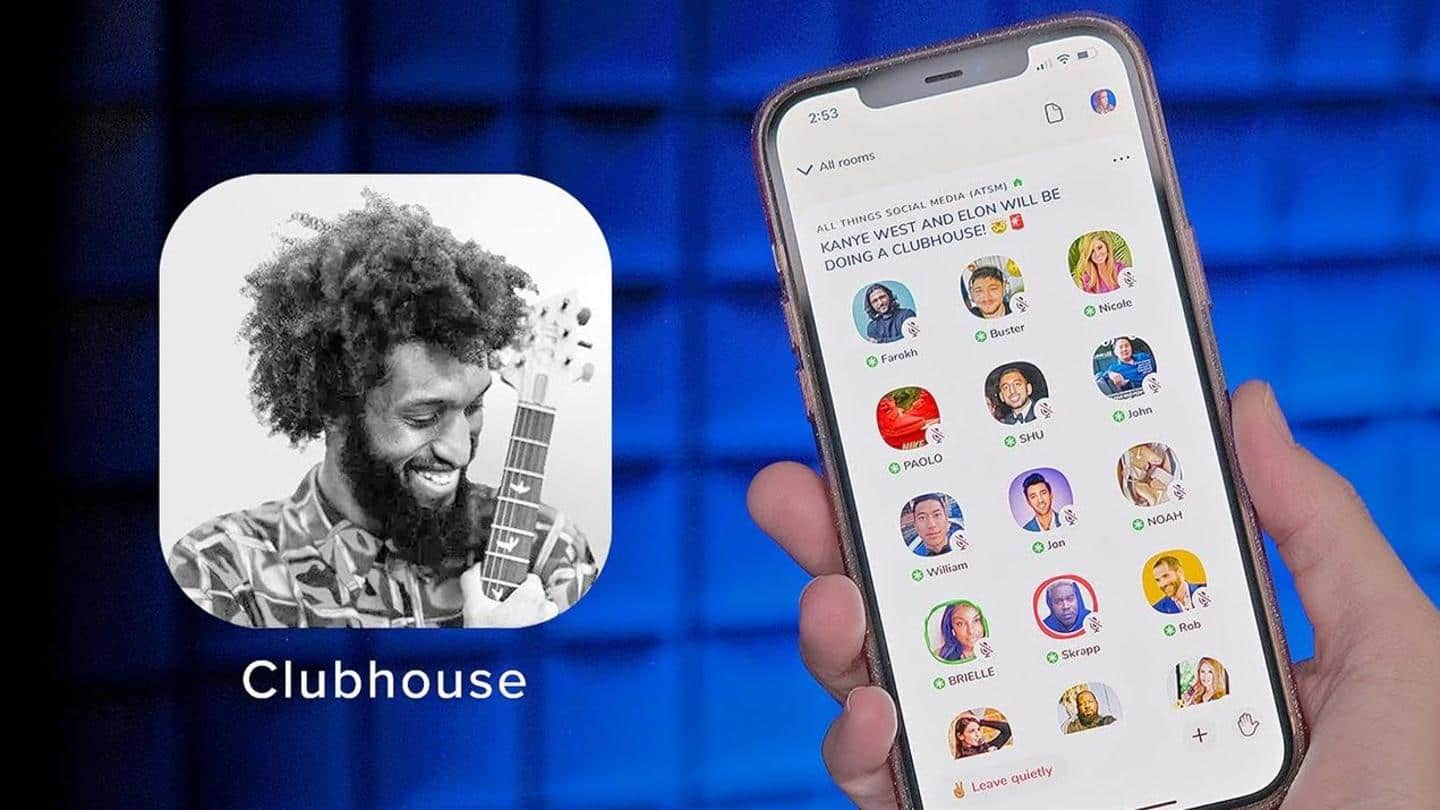
All you should know about new social media platform Clubhouse
What's the story
Clubhouse is an audio-based social networking app that allows people to participate in discussions on diverse topics of interest. They can also listen in on conversations between eminent individuals in real time by joining chat rooms. The app is invite-only and exclusively for iOS, however, it can't be downloaded from the App Store either. This exclusivity evidently contributes to the platform's hype.
Invite-only
Clubhouse deploys yacht club membership model and podcast-style conversation rooms
Just like a real-life yacht club, one needs to be invited to join Clubhouse by someone who's already on it. Initially, each new user can send only two invites. Upon signing up, users are prompted to select topics of interest based on which Clubhouse recommends conversation rooms and individuals one can follow. Conversation rooms are like podcasts with a few speakers and many listeners.
Immense demand
Attendee limitations, disappearing content push Clubhouse conversations to YouTube live-streams
Each conversation room allows only a limited number of attendees. The room disappears after the conversation concludes. This has caught the interest of YouTube content creators, who now record and live-stream chat rooms from Clubhouse. The hype surrounding the platform has even prompted Tesla CEO Elon Musk to interview Robinhood app CEO, Vlad Tenev on Clubhouse following the recent WallStreetBets phenomenon.
How?
Invites to Clubhouse being sold online in communities and marketplaces
For up to $125, one can buy invites being sold online on Reddit, eBay, and Craigslist, however many advertisements seem dodgy. Although Clubhouse has been operational since March last year, the demand for invites has spiked following free speech advocate Musk's promotion of the app. Despite its invite-limited and iOS-only nature, Clubhouse has nevertheless touched the 2 million user mark in February.
'The Good Time Show'
Musk interviewed Robinhood CEO; Zuckerberg advertised AR on Clubhouse app
Even as Musk's high-profile Clubhouse's interaction reached the limit of 5,000 listeners within seconds, the platform also hosted Facebook boss Mark Zuckerberg on The Good Time Show, which is a popular chat room hosted regularly on the app. Zuckerberg used the opportunity to advertise Facebook's endeavors in virtual and augmented reality, even as the company is developing a Clubhouse clone behind the curtains.
Using social media
Silicon Valley Diplomacy: Musk reaches out to Putin on Clubhouse
Interestingly, Musk recently invited Russian leader Vladimir Putin for a Clubhouse interaction, opening up a new avenue for diplomatic outreach, with MIT AI researcher, Lex Fridman offering to translate/moderate the interaction. Musk doesn't have the best relations with the Russian space agency on account of its rivalry with SpaceX, so Clubhouse could serve as an unusual medium to break the proverbial ice.
Details
Clubhouse's claim to fame: Celebrity promotions, exclusivity, and organic interaction
Clubhouse seems to have played its cards right for a contemporary social media start-up. The strategy is reminiscent of Facebook which initially allowed only harvard.edu email address holders to sign up. Clubhouse says work is in progress to open the platform to "the whole world". The other aspect of going for Clubhouse is more organic and engaging interaction via audio in real-time.
Active participation
Clubhouse is designed for more than just content consumption
Traditional social media platforms such as Twitter and Facebook also provide audio and video content to users. However, that is meant to be consumed passively much like television. Clubhouse's unique model allows for more real-time engagement between individuals. Users can seamlessly interact with one another and high-profile celebrities by contributing to panel discussions and engaging in conversations with other members within the platform.
Seeking company
The app provides means to access purposeful real-time human connections
In the same vein, Clubhouse capitalizes on the need for realistic human interaction. During the COVID-19 pandemic and the lockdowns that followed, the dearth of personal interaction sent people online looking for purposeful ways to connect with one another. Clubhouse's live voice-based interactions fill that void. It gives users the much-needed human connection as they participate in discussions about topics they are passionate about.
Free speech?
Big Tech cabal finds live-streamed content more difficult to censor
Notably, Clubhouse doesn't maintain logs or host live-streamed events on its platform, like Twitch does. This makes it less likely to be swayed by Big Tech's moderation attempts. Live content cannot be moderated as effectively as current mediums with persistent content. Clubhouse could be the new bastion for free speech, as is evident from the Chinese government's decision to ban it outright.
Meanwhile, in China
China bans Clubhouse but not before citizens discuss forbidden topics
Despite the Chinese Government's penchant for suppressing dissent, Clubhouse was available in the country until recently. Users from the country reportedly discussed otherwise censored topics such as democracy, Hong Kong, and Uighur camps in Xinjiang. Separately, Chinese e-commerce sites such as Xianyu and TaoBao listed Clubhouse invites for sale priced between 150 to 400 yuan ($23 to $61).
Leveraging FOMO
Disappearing content ensures users stay hooked to avoid missing out
Finally, the disappearing content taps users' fear of missing out (FOMO), thereby keeping them hooked as conversations become inaccessible once concluded. While this is essentially how all social media platforms operate, users are less likely to swipe away a notification to join a room that could potentially manifest into an engaging and insightful discussion among like-minded users.